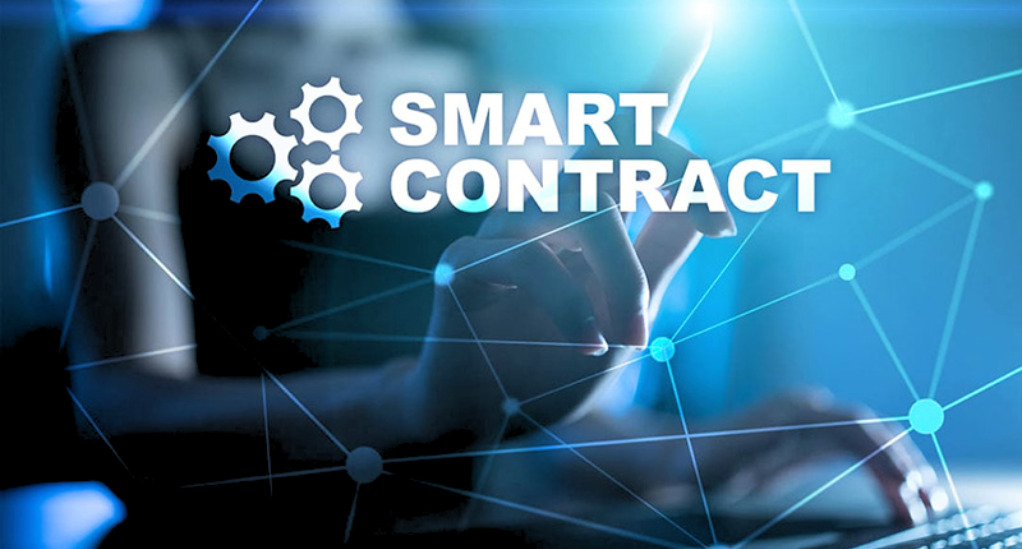
Smart Contracts: Revolutionizing Transactions in the Digital Age
In the digital age, smart contracts stand as a beacon of security and efficiency, reshaping transactions through blockchain technology. This article navigates the intricate world of smart contracts, offering a deep dive into their transformative potential in various industries. Join us as we unravel the future of digital transactions, guided by innovation and trust.
Smart Contracts and Blockchain
In this section, we unravel the deep-seated connection between smart contracts and blockchain technology, laying a solid foundation to understand the revolutionary impact of smart contracts in various domains.
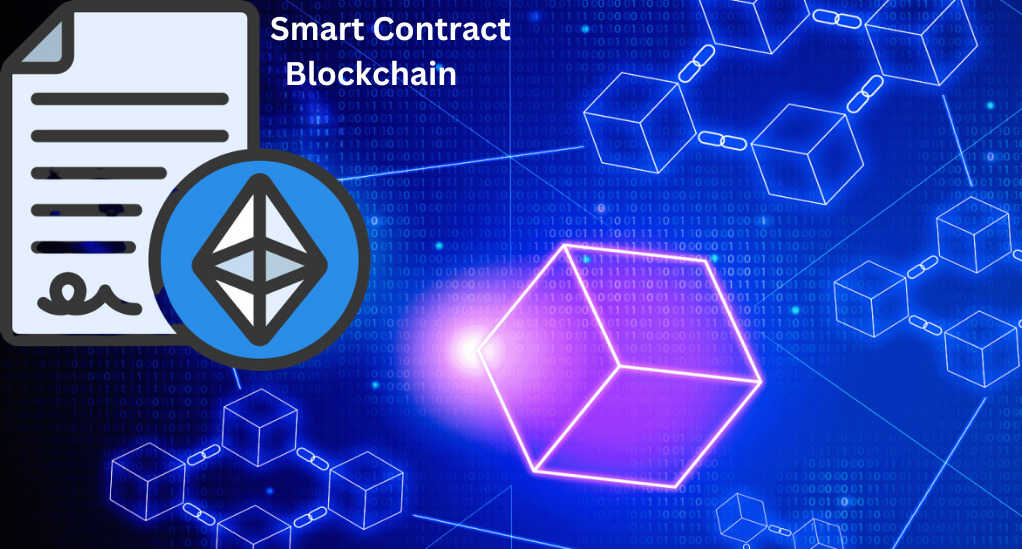
Understanding Blockchain Technology
Blockchain technology, often hailed as the underpinning technology of smart contracts, represents a transformative innovation in the world of digital transactions. Its emergence into the mainstream was catalyzed by the launch of Bitcoin in 2008. At its core, a blockchain is a decentralized ledger that records all transactions occurring across a distributed network of computers. This groundbreaking technology offers a secure and transparent means of recording transactions without the need for a central authority, making it particularly well-suited for applications like cryptocurrencies and smart contracts.
The foundational idea is that transactions are stored within data structures called “blocks,” which are then linked together in chronological order to form a “chain.” Every computer connected to the blockchain network, known as a “node,” plays a crucial role in participating in the consensus mechanism, which is the protocol used to validate and agree upon the state of the blockchain. Common consensus mechanisms include Proof of Work (PoW) and Proof of Stake (PoS), which ensure the integrity and security of the blockchain by requiring network participants to contribute resources or stake their assets as collateral.
How Smart Contracts Operate on a Blockchain
Smart contracts represent a groundbreaking innovation in the realm of decentralized digital agreements. These self-executing contracts are designed to streamline and automate complex transactions by encoding their terms directly into code, which is then deployed on a blockchain. The process begins with parties agreeing on the terms of the contract, and a skilled developer transforms these terms into a smart contract’s code. Once deployed on the blockchain, the smart contract becomes immutable and tamper-proof, ensuring that the agreed-upon terms cannot be altered by any party. As the blockchain network operates autonomously, the smart contract continuously monitors the predefined conditions. When these conditions are met, the contract automatically executes the agreement without the need for intermediaries. This not only expedites the process but also significantly reduces the potential for disputes or errors.
Security Features of Blockchain that Benefit Smart Contracts
Blockchain technology bestows smart contracts with robust security features, ensuring trust and reliability in transactions. Some of the pivotal security features include:
- Immutability: Once a smart contract is deployed on a blockchain, it cannot be altered, ensuring trust and transparency.
- Decentralization: The absence of a central authority reduces the risk of fraud and manipulation.
- Encryption: Blockchain employs advanced cryptographic techniques to secure data, safeguarding it from unauthorized access.
The Benefits of Smart Contracts
In this segment, we delve into the manifold benefits of smart contracts, which stand as the cornerstone in revolutionizing transactions in the digital landscape. From speed and efficiency to trust and reliability, we dissect each advantage, offering you a comprehensive understanding of why smart contracts are becoming increasingly indispensable in today’s digital transactions.
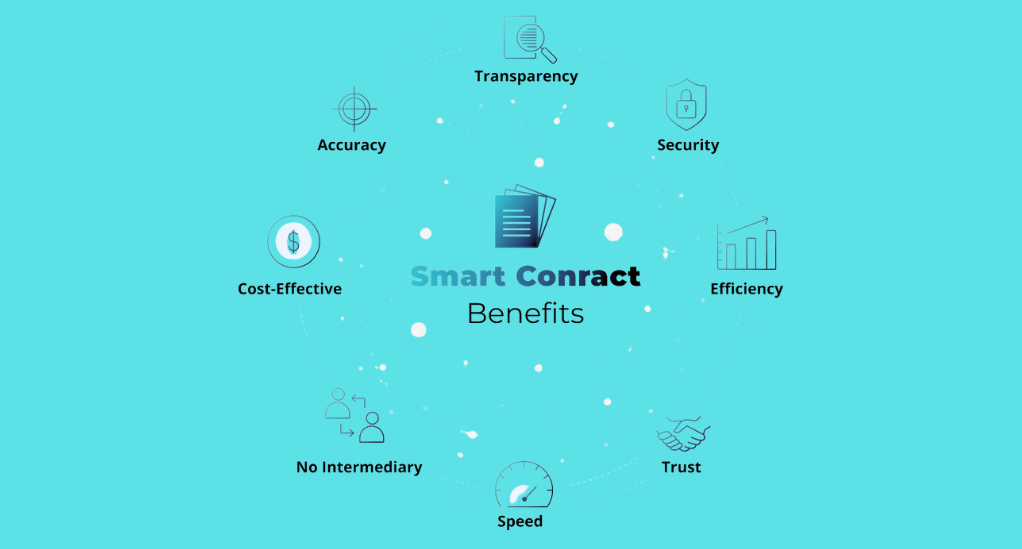
Speed and Efficiency in Transactions
Smart contracts operate on automated processes, significantly reducing the time traditionally required to manually process and enforce contracts. Let’s break down the elements that contribute to the speed and efficiency of smart contracts:
- Real-Time Processing: Transactions are processed in real-time, facilitating quicker settlements.
- Batch Processing: Smart contracts can handle batch transactions efficiently, further speeding up the process.
- Elimination of Intermediaries: By removing the need for intermediaries, smart contracts streamline the transaction process, making it faster and more straightforward.
Trust and Reliability
Smart contracts foster trust and reliability in transactions through the following mechanisms:
Transparency: All parties involved have access to the immutable terms of the contract, fostering trust.
Security: The blockchain technology underlying smart contracts ensures high-level security, enhancing reliability.
Verification: Transactions are verified through consensus mechanisms, ensuring authenticity and trustworthiness.
Cost-Effectiveness
Smart contracts cut down costs substantially by eliminating the need for intermediaries such as banks, lawyers, and notaries. Here we explore how smart contracts achieve cost-effectiveness:
- Lower Transaction Fees: Smart contracts incur minimal fees compared to traditional contracts.
- Reduced Administrative Costs: Automation reduces administrative workload, thereby cutting down costs.
- Prevention of Fraud: The secure nature of blockchain technology minimizes the risk of fraud, avoiding potential financial losses.
Automation and Accuracy
Automation is a central and pivotal feature of smart contracts, essential for ensuring precision and efficiency in transactions. These contracts rely on pre-defined rules meticulously encoded within them, guaranteeing precise execution in line with the intended agreement. Through their self-executing nature, smart contracts autonomously trigger actions when specific conditions are met, significantly reducing the potential for errors. This automation fosters a high degree of accuracy in transactions, ensuring that they unfold precisely as agreed upon, ultimately minimizing the occurrence of disputes and conflicts in the process.
Use Cases of Smart Contracts
In this section, we venture into the diverse landscapes where smart contracts find their applications, revolutionizing industries from real estate to government systems. Let’s dissect each domain to understand how smart contracts are reshaping the way we engage in transactions and agreements in the digital age.
Real Estate
Smart contracts are transforming the real estate industry, making transactions more transparent and efficient. Here we explore the different facets:
- Property Sales and Leases: Automating the process of sales and leases, ensuring transparency and reducing the time taken to close deals.
- Tokenization of Property: Enabling the division of property into tokens that can be easily and securely bought.
- Property Management: Streamlining the management processes, including payment of utilities and maintenance through automated systems.
| Traditional Real Estate Processes | Smart Contract Processes |
|---|---|
| Manual documentation and verification | Automated and secure verification |
| Time-consuming sales processes | Swift and efficient transactions |
| High transaction fees | Reduced costs due to elimination of intermediaries |
Healthcare
Smart contracts are poised to usher in a transformative era in healthcare, where they enhance both efficiency and security across various critical aspects. One significant application lies in the secure and efficient management of patient records, ensuring robust data privacy and seamless accessibility for authorized parties. Additionally, smart contracts can revolutionize drug traceability by enabling the transparent tracking of pharmaceuticals from the manufacturer to the end-user, ensuring their authenticity and safety. Furthermore, these contracts hold the potential to automate and expedite insurance claims processing, introducing a faster and more transparent approach that benefits both patients and healthcare providers. In sum, the adoption of smart contracts in healthcare promises to optimize operations, safeguard data, and streamline critical processes, ultimately improving the overall healthcare experience.
Supply Chain Management
In the realm of supply chain management, smart contracts offer transformative solutions. Here we explore how:
- Product Traceability: Enabling consumers to trace the journey of products, ensuring authenticity and quality.
- Automated Payments: Facilitating automated payments upon meeting predefined conditions, enhancing efficiency.
- Compliance Monitoring: Automating the monitoring of compliance with regulations and standards, reducing the risk of violations.
Government and Voting Systems
Smart contracts hold the potential to revamp government operations and voting systems. Let’s explore the avenues:
Transparent Governance: Facilitating transparent governance through the secure and transparent recording of transactions.
Voting: Enhancing the security and transparency of voting systems through blockchain-based solutions.
Public Records: Streamlining the management of public records, ensuring security and easy access.
Smart Contracts and Finance
In this section, we delve into the financial realm to understand how smart contracts are revolutionizing various facets of the industry, from decentralized finance to asset management. Let’s take a step-by-step journey to comprehend the depth of impact smart contracts have in the financial sector.
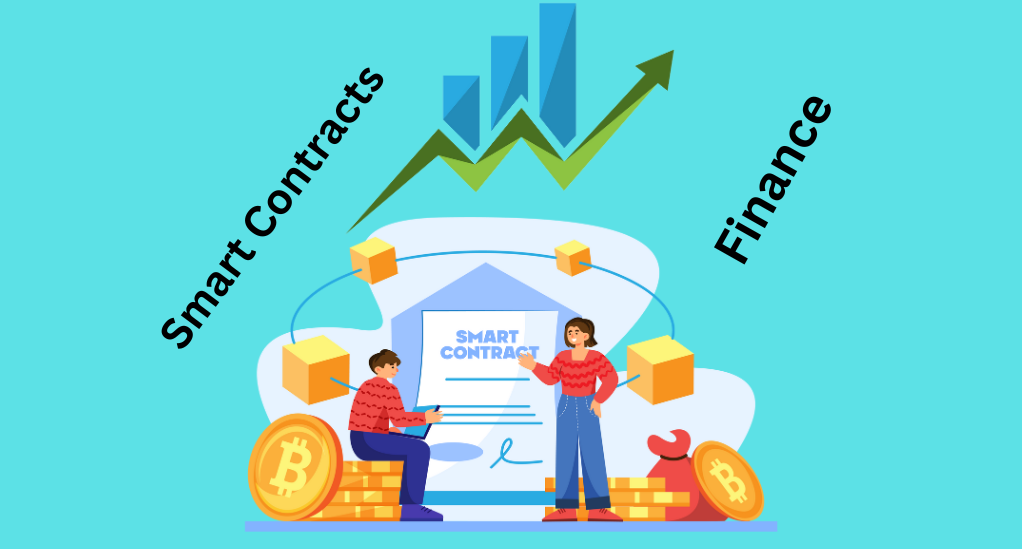
Decentralized Finance (DeFi)
Decentralized finance, or DeFi, stands as a robust application of smart contracts in the financial sector. Here, we dissect its various aspects:
- Liquidity Mining: Detailing how smart contracts facilitate liquidity mining, encouraging users to provide liquidity and earn rewards.
- Yield Farming: Exploring the concept of yield farming, where smart contracts automate the process of finding the most efficient financial services.
- Decentralized Exchanges (DEXs): Understanding how smart contracts power DEXs, offering a secure and transparent platform for trading cryptocurrencies.
Insurance
Smart contracts are reshaping the insurance sector, offering automated and transparent solutions. Let’s delve into the specifics:
Claim Processing: Automating claim processing to ensure swift and transparent settlements.
Fraud Prevention: Leveraging the security features of blockchain to prevent fraud and ensure authenticity in claims.
Customized Policies: Facilitating the creation of customized insurance policies through smart contract protocols.
Loans and Mortgages
In the loans and mortgages sector, smart contracts are introducing transformative solutions. Here we explore how:
- Automated Approval: Streamlining the approval process through automated verification of eligibility criteria.
- Transparent Terms: Ensuring transparent and immutable terms to foster trust between lenders and borrowers.
- Secure Transactions: Leveraging blockchain technology to secure transactions and protect sensitive data.
Asset Management
Smart contracts are orchestrating a revolution in asset management, harnessing automation and bolstered security measures to transform the landscape. One key avenue is the tokenization of assets, which simplifies the process of representing and trading assets as digital tokens, facilitating swift and secure transactions while expanding accessibility. These contracts also introduce the concept of real-time settlements, revolutionizing efficiency by enabling near-instantaneous settlement of asset transfers, thereby reducing counterparty risk and optimizing resource allocation. Furthermore, smart contracts excel at automating regulatory compliance, ensuring that asset management operations adhere to the intricacies of ever-evolving regulatory requirements, thereby bolstering trust and reliability in the asset management ecosystem. In sum, smart contracts are reshaping the asset management industry, offering precision, speed, and compliance in a manner previously unparalleled.
Smart Contracts and IoT
In this section, we delve into the fascinating intersection of smart contracts and the Internet of Things (IoT), a dynamic duo that promises to redefine the digital landscape. Let’s embark on a detailed exploration of this synergy, understanding each element step by step to grasp the transformative potential it holds.
Definition of IoT
Before we delve deeper, it is pivotal to understand what IoT entails. The Internet of Things (IoT) refers to a network of interconnected devices that can communicate with each other over the internet, sharing data and insights to facilitate smarter operations. These devices range from household appliances to industrial machines, all equipped with sensors and software to enable connectivity and data exchange.
The Role of Smart Contracts in IoT
Smart contracts find a significant role in the IoT ecosystem, bringing automation and security to various processes. Here we explore the different facets:
- Automated Transactions: Smart contracts facilitate automated transactions between IoT devices, enhancing efficiency.
- Data Integrity: Ensuring the integrity of data exchanged between devices through secure and immutable blockchain protocols.
- Decentralized Applications (DApps): Facilitating the development of DApps that can control and manage IoT devices securely and efficiently.
| Application Area | Description |
|---|---|
| Home Automation | Automating home appliances based on predefined conditions set in smart contracts. |
| Supply Chain | Ensuring transparency and efficiency in supply chain processes through automated tracking and reporting. |
| Healthcare | Facilitating secure and automated data exchange in healthcare devices. |
Security and IoT
Security stands as a pivotal concern in the IoT landscape. Let’s delve into how smart contracts can enhance security in IoT:
- Data Encryption: Leveraging blockchain technology to encrypt data, ensuring secure communication between devices.
- Access Control: Facilitating secure and automated access control systems through smart contracts.
- Tamper-Proof: Ensuring that the data is tamper-proof, fostering trust and reliability in IoT systems.
Case Studies Showcasing the Integration of Smart Contracts and IoT
In real-world case studies, the successful integration of smart contracts and IoT technology has brought transformative outcomes. One prominent example is De Beers, a global diamond company, which utilized blockchain and smart contracts to bolster transparency in its diamond supply chain. This integration has resulted in enhanced trust and transparency, guaranteeing that the diamonds are conflict-free and ethically sourced, thus addressing significant concerns within the industry. Additionally, the smart home sector saw innovation through companies like LIFX, which integrated smart lighting solutions with blockchain and smart contracts. This advancement allows users to create and automate customized lighting settings based on various conditions, significantly enhancing both convenience and energy efficiency in everyday life. These case studies exemplify how the synergy between smart contracts and IoT is reshaping industries and improving the lives of consumers.
The Development Platforms for Smart Contracts
In this section, we delve into the prominent platforms that facilitate the development of smart contracts, offering a rich ground for innovation and implementation. Let’s take a detailed journey through each platform, understanding their unique features and capabilities, and finally comparing them to help you choose the best fit for your smart contract development needs.
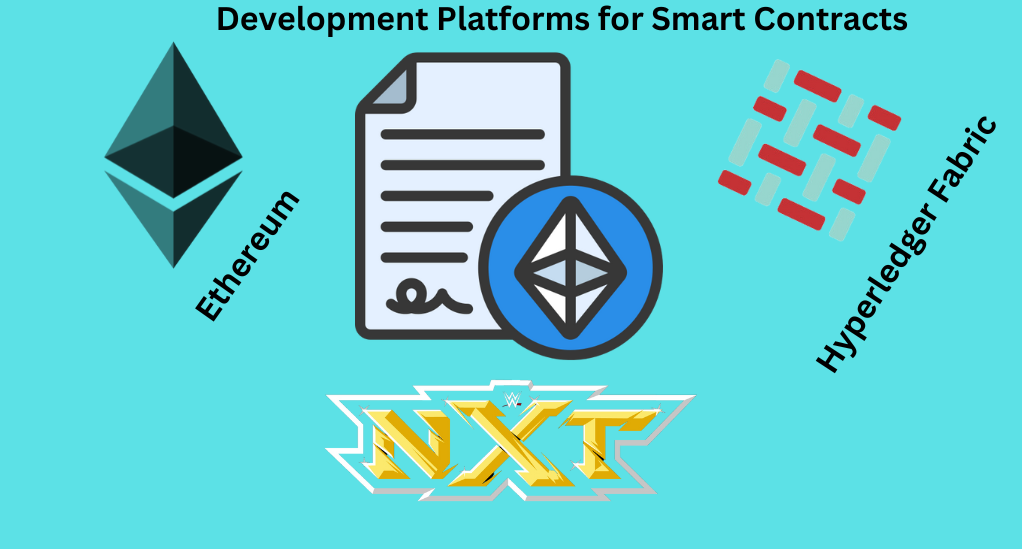
Ethereum
Ethereum stands as a frontrunner in the smart contract space, offering a robust and versatile platform for developers. Let’s explore its features:
- Solidity Language: Ethereum employs Solidity, a high-level programming language, for developing smart contracts.
- Decentralized Applications (DApps): It facilitates the development of DApps, enhancing the scope of blockchain technology.
- Active Community: Ethereum boasts a vibrant community of developers and enthusiasts, fostering innovation and collaboration.
Hyperledger Fabric
Next, we venture into the world of Hyperledger Fabric, an open-source project hosted by the Linux Foundation. Here we dissect its various aspects:
- Modular Architecture: Hyperledger Fabric offers a modular and configurable architecture, allowing for tailored solutions.
- Permissioned Network: It operates on a permissioned network, ensuring secure and authenticated transactions.
- Chaincode: Smart contracts in Hyperledger Fabric are known as Chaincode, facilitating secure and efficient contract execution.
NXT
NXT is another significant player in the smart contract arena. Let’s delve into its features:
- Proof-of-Stake (PoS) Consensus: NXT operates on a PoS consensus mechanism, promoting energy efficiency.
- Asset Exchange: It offers a built-in asset exchange, facilitating secure and transparent asset transactions.
- Marketplace: NXT features a decentralized marketplace, encouraging peer-to-peer transactions without intermediaries.
Comparison of Different Platforms
To aid in a comprehensive understanding, we present a comparison of the different platforms based on various parameters:
| Parameter | Ethereum | Hyperledger Fabric | NXT |
|---|---|---|---|
| Consensus Mechanism | Proof-of-Work (transitioning to Proof-of-Stake) | Pluggable (can be configured as per requirement) | Proof-of-Stake |
| Smart Contract Language | Solidity | Chaincode (supports various languages) | Java |
| Community Support | Large and active | Substantial with enterprise focus | Moderate |
| Transaction Speed | Moderate | High | High |
| Security | High | High (with permissioned network) | High |
Challenges and Concerns
As we navigate further into the world of smart contracts, it is imperative to address the challenges and concerns that accompany this revolutionary technology. In this section, we dissect the various hurdles, ranging from security vulnerabilities to technical barriers, offering a comprehensive view of the landscape to foster a well-rounded understanding of smart contracts.
Security Vulnerabilities
Despite the robust security features of blockchain technology, smart contracts are not entirely immune to vulnerabilities. Let’s delve into the potential security issues:
- Code Bugs: Smart contracts are as secure as the code they are written in. Bugs in the code can lead to vulnerabilities, exposing the contract to attacks.
- Reentrancy Attacks: Detailing the concept of reentrancy attacks, where an attacker can withdraw funds repeatedly, exploiting the contract’s logic.
- Gas Limit: Exploring the issue of gas limits in platforms like Ethereum, which can potentially limit the execution of complex contracts.
Legal and Regulatory Challenges
Smart contracts face a myriad of legal and regulatory challenges. Here we explore the different facets:
Legal Recognition: Discussing the challenges in gaining legal recognition for smart contracts, given their digital and automated nature.
Regulatory Compliance: Delving into the need for smart contracts to comply with existing regulatory frameworks, and the challenges therein.
Dispute Resolution: Exploring the avenues for dispute resolution in the context of smart contracts, and the existing gaps in the legal framework.
Technical Barriers and Limitations
Smart contracts encounter technical barriers and limitations, notably in scalability, where handling a large number of transactions efficiently remains a challenge. Achieving interoperability between different blockchain platforms hosting smart contracts is also complex. Additionally, the development of smart contracts demands expertise in both blockchain technology and programming languages, posing a barrier to entry for developers. Addressing these challenges is crucial for realizing the full potential of smart contracts across various industries.
Future Trends and Developments
As we stand on the cusp of a digital revolution spearheaded by smart contracts, it is pivotal to cast our gaze towards the future, envisioning the trends and developments that are set to shape the landscape. In this section, we delve into the exciting avenues of integration with artificial intelligence, cross-industry collaborations, and the potential innovations that lie on the horizon, offering a glimpse into a future brimming with possibilities.
Integration with Artificial Intelligence
The convergence of smart contracts with artificial intelligence (AI) promises to unlock unprecedented potentials. Let’s explore this integration step by step:
- Automated Decision-Making: Detailing how AI can facilitate automated decision-making in smart contracts, enhancing efficiency and responsiveness.
- Predictive Analytics: Delving into the role of AI in offering predictive analytics, aiding in more informed and strategic decision-making in contracts.
- Security Enhancements: Discussing how AI can bolster the security of smart contracts through advanced monitoring and anomaly detection.
Cross-Industry Collaborations
As we venture further, we find that cross-industry collaborations stand as a significant trend in the smart contract landscape. Let’s delve into the various facets:
Supply Chain and Healthcare: Exploring collaborations between supply chain and healthcare sectors to enhance transparency and efficiency in healthcare supply chains.
Finance and Real Estate: Discussing potential synergies between the finance and real estate sectors, fostering seamless and secure transactions.
Government and Education: Detailing collaborative efforts between government and education sectors to streamline educational processes through smart contracts.
Potential Innovations on the Horizon
Looking ahead, promising innovations for smart contracts include quantum-resistant designs for future-proof security, the integration of zero-knowledge proofs to enhance privacy, and the vision of interoperable smart contract platforms for expanded connectivity across diverse blockchain networks. These advancements signify a dynamic future for smart contracts, marked by heightened security and increased versatility.
Conclusion
As we conclude, it is clear that smart contracts are pivotal in the digital transformation journey, promising unparalleled efficiency and security in transactions across various industries. While challenges exist, the potential for innovation is immense. As we forge ahead, smart contracts beckon a future of decentralized yet cohesive systems, steering us towards a new era of transparency and trust in the digital landscape.


Leave a Reply